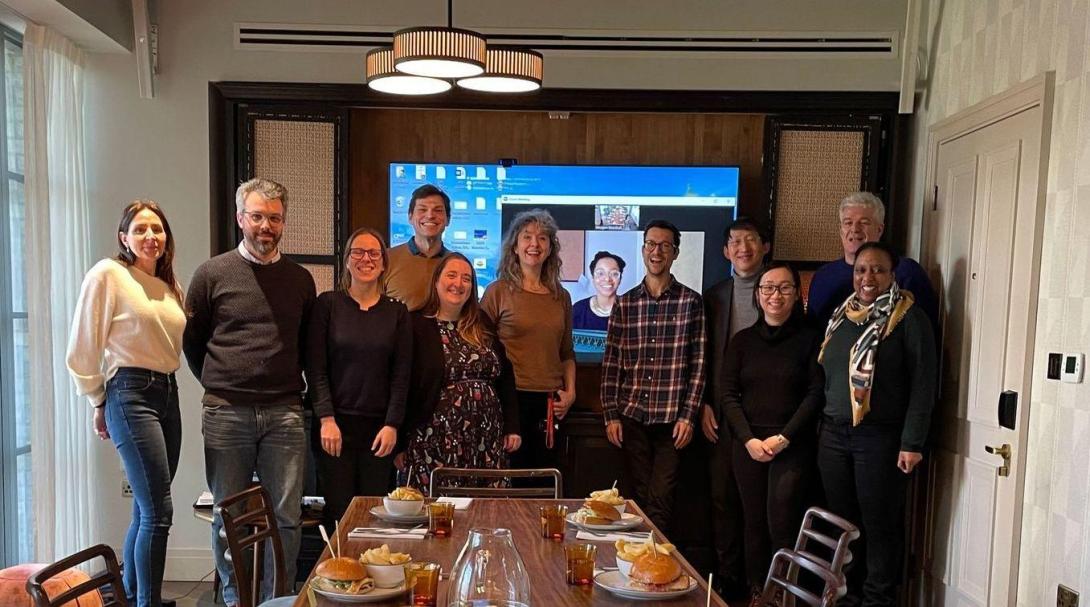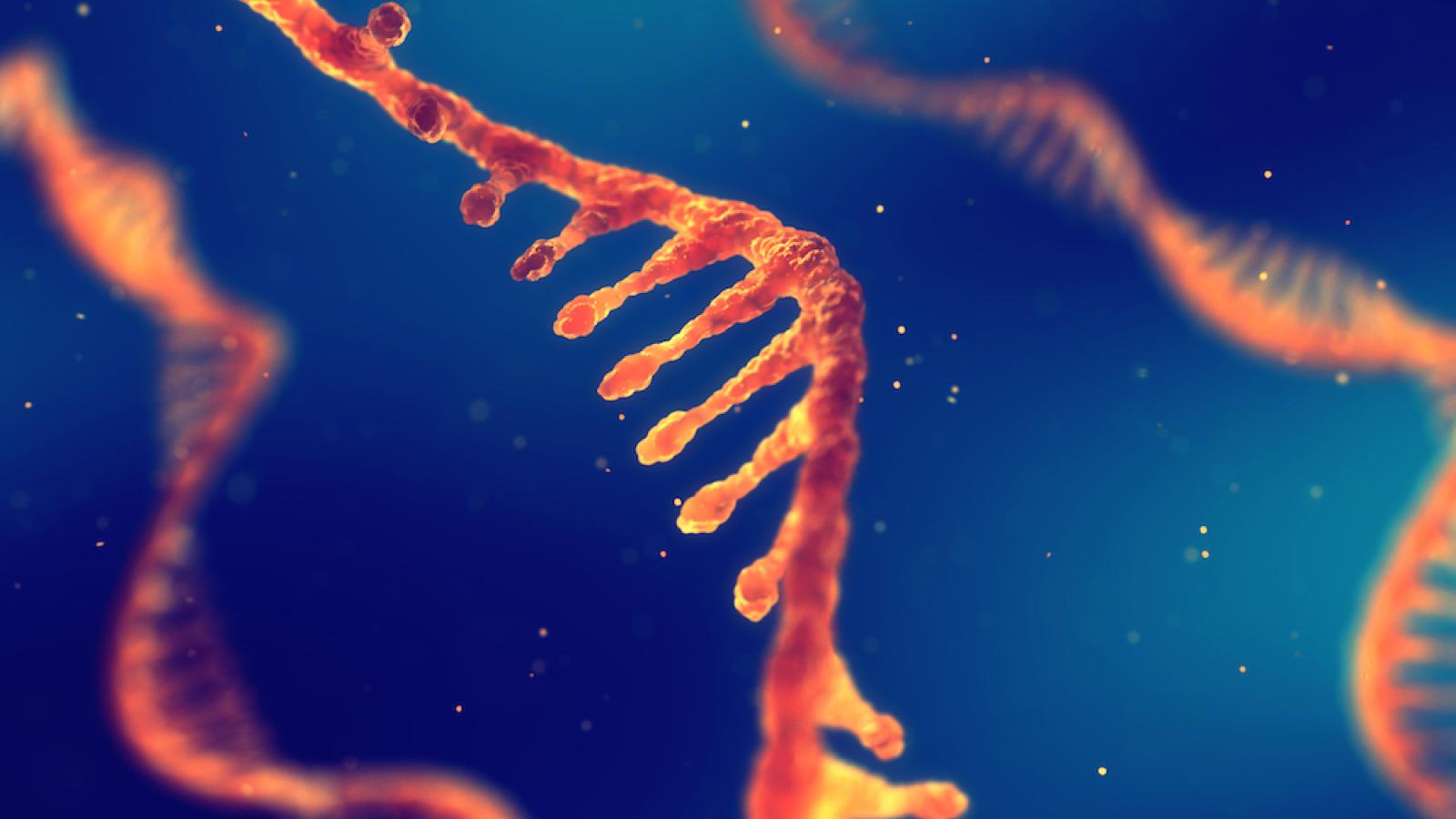RNAs (ribonucleic acid) are fundamental macromolecules for our cells, with crucial roles in the translation of genetic information into complex proteins and in gene expression regulation. Prof Jernej Ule is a leading expert on RNA biology, and having joined the UK DRI at King’s as Centre Director last year, he aims to better understand the roles of RNA regulation in neurodegeneration. We caught up with Prof Ule to hear more about his new lab at King’s, a major project harnessing RNA for targeted therapeutic delivery and his experience of Centre leadership so far.
The complexities of RNA networks
“So people usually know me as the CLIP person,” explains Prof Ule, referring to the ‘cross-linking and immunoprecipitation’ technique he pioneered during his PhD with Prof Robert Darnell at Rockefeller University. This method, allowing the identification of direct protein-RNA interactions, has formed the foundation of his research portfolio to date.
“It is common that users of CLIP want to know the few ‘primary’ RNA interactions with their protein of interest. This is particularly so when it comes to diseases that involve RNA, where one wants to identify a candidate RNA target to go off and develop a therapeutic against.”
However, over the last 20 years of research, studies using CLIP have shown that protein-RNA networks are usually very complex.
“From my very first CLIP experiments with brain-specific ‘Nova’ proteins, it’s become clear that most RNA-binding proteins can have in the order of between 10k to 100k interacting sites across the transcriptome that are of comparable affinity when it comes to biophysics. This is because RNA molecules present a huge number of sites for interaction, especially the large intronic sequences that are most common in neurons, and thus each RNA transcript can bind to hundreds of proteins at any point.”
This revelation has steered Prof Ule’s current focus on the RNA network principles that enable feedback regulation, where proteins and RNAs can balance one another to maintain homeostasis. It is becoming clear that cellular homeostasis becomes gradually eroded in age-related diseases, and Prof Ule believes that better understanding of the roles that protein-RNA networks play in such homeostasis will offer key points of modulation for development of future therapeutics.
In his lab at UK DRI at King’s, Prof Ule now applies his team’s knowledge of RNA biology and technical expertise to the development of therapies for neurodegeneration, primarily in motor neuron disease (MND).
“MND is a good starting point because there are so many mutations that directly affect protein-RNA complexes, either via RNA-binding proteins or via RNAs that they bind. There is a lot of momentum across the field, with different technologies coming together. By adding our own technology, we can benefit from everything else, so it is a really good way to move quickly.”
New territory in gene therapy
Prof Ule and collaborators have just been awarded a £5.5m Wellcome discovery award to exploit RNA-protein interactions to improve gene therapy delivery. Currently, most therapies used in clinical practice are not selective for diseased cells, and so the therapy can affect cells that are healthy. This may be acceptable in acute treatments, such as for instance cancer chemotherapy, but in chronic diseases such as neurodegeneration that may require long-term treatments, greater selectivity would be advantageous. Especially in the pre-symptomatic stages of disease, many long-term treatments may start to become toxic for healthy cells. Prof Ule explains their proposed solution.
“Once we identify the signatures in endogenous RNAs that display early changes in cells affected by disease pathogenesis, we can introduce these signatures into gene therapy vectors. This process, known as ‘gene gating’, enables the vector to be expressed specifically in the ‘unhealthy’ cells, and then the therapy switches itself off once the cells regain their homeostasis.”
The 8-year programme is pioneering for brain disorders where thus far it has only been applied to epilepsy by grant collaborator Dr Gabriele Lignani. Here, the researchers identified activity-dependent genes and used promoter signatures to guide gene therapy to neurons undergoing hyperactivity. Prof Ule believes that promoters will need to be combined with RNA regulation in the more slowly-progressing, complex disorders, and as part of the grant the team will look to primarily investigate autism-spectrum disorders (ASD) and Alzheimer’s disease.
“I’m collaborating with top experts in ASD, Dr Laura Andreae and Prof Ben Blencowe. In ASD, strong RNA signatures are already known in the form of ‘microexons’. The issue with ASD conditions is that they lack clear molecular pathogenesis signatures, so one needs to study complex behavioural phenotypes. For Alzheimer’s, there is the opposite problem where Tau inclusions offer a clear readout of molecular pathogenesis, but the RNA signatures are less well understood. I’ll be working closely with UK DRI colleague Prof Karen Duff on this part of the project, and we think that the application could be used to gate expression of gene therapy treatments that are already considered for clinical trials."

Prof Ule with the team of Group Leaders, Co-investigators, Associate Members and administrative staff from the UK DRI at King's
Fresh direction
Prof Ule took up the position of Centre Director at King’s in April 2022. Already seeing benefits for his own research with the sharing of knowledge and new collaborations, he also aims to build upon the Centre’s current focus on MND and RNA expertise, setting his sights on the wider neurodegenerative field.
“MND and RNA go hand-in-hand and there's a lot of ways to mutually reinforce the progress on both fronts, but our new insights and technology are actually very applicable across neurodegeneration. The beauty of the UK DRI is that we can so easily cross-fertilise into several areas. Locally we mainly work on model systems of MND, but we want to be a Centre that will provide expertise to the rest of the Institute where possible.”
To help achieve these goals, Prof Ule has recently recruited two new Group Leaders to the Centre - Dr Andrea Serio and Dr Sarah Marzi.
“We brought in the kind of expertise that really connects us all as a team and could drive forward the research across UK DRI. Andrea is building bioengineering and micro-fabrication facilities, which he plans to provide across the Institute. He’s using these technologies along with advanced imaging and machine learning to characterise the localised control of RNA at specific compartments of polarised cells, such as neurons. Sarah Marzi has great expertise in data science, machine learning and epigenetics across various type of cell types and brain regions, which among others will be important for understanding the time window when therapies are expected to be most effective. Both are already connected to colleagues in other UK DRI centres, so they will help to keep our centre well integrated.”
Given the strengths of both new teams in computation, Prof Ule hopes that the King’s Centre will be able to provide data science solutions across UK DRI. Prof Ule is a core academic partner for Flow.bio, a bioinformatics web platform that is hosted on his King’s computational server, where it is available for wet lab scientists to be able to analyse, store, curate and share sequencing data at scale. Working with Prof Caleb Webber, UK DRI Director of Data Science, and Dr Amonida Zadissa, UK DRI Associate Director of Informatics, he hopes this application will become increasingly useful across UK DRI and beyond.
Links
· Prof Jernej Ule’s UK DRI research profile
· Offspring magazine (podcast) interview with Prof Ule – part 1 & part 2
· ‘New Wellcome Discovery Award to study gene regulation in autism spectrum disorder and Alzheimer's disease’– King’s College London media release
· Q&A with Group Leader Dr Andrea Serio
· Q&A with Group Leader Dr Sarah Marzi
Article published: 26 July 2023
Banner image: Shutterstock/ CI Photos
